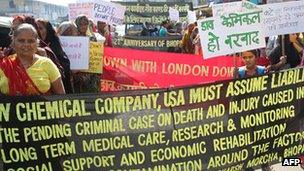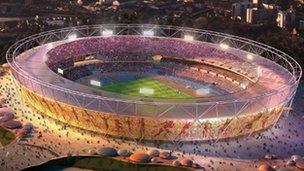London 2012: India Olympics body in 'Drop Dow' bid
- Published

Some rights groups, athletes and politicians have called for Dow's Olympic sponsorship to be shelved
India's Olympic Association has urged the Olympics' global governing body to end Dow Chemical's Games sponsorship.
The chemical manufacturer's involvement had stoked ire because of its links with the firm behind the 1984 Bhopal gas disaster in India.
IOA acting president VK Malhotra said the US multinational had launched a "false campaign" claiming victims had been paid final compensation.
Dow says the £288m ($470m) settlement for those affected is fair and final.
The company insists that while the past must never be forgotten, its "position as a Worldwide Olympic Partner" - a decade-long deal reached with the International Olympic Committee (IOC) in 2010 - represents its "vision for the future".
'No boycott'
In a letter to IOC President Jaques Rogge, Mr Malhotra said Dow should be removed as sponsors of the Games.

Dow said its branding would not appear on five "test panels" which would be used before the Olympics
He urged Mr Rogge "to urgently take this matter up with the organisers of the London Games and also convey our concerns to them and ensure the matter is sorted out amicably".
"A false campaign has been launched by the Dow Chemical's saying that matter has been settled," said Mr Malhotra. "It is not correct. The case is still pending in the court and no final compensation has been made."
Mr Malhotra also wrote to India's Sports Minister Ajay Maken, calling for him to clarify the government's position on the issue.
The IOA said strong protests were raised against Dow's Olympics sponsorship at the body's general meeting on Thursday. But the IOA said last month there was "no question" of a boycott of the Games amid the furore.
On Monday, Games organisers Locog confirmed the £7m fabric wrap around the 2012 Olympic Stadium would not feature Dow branding.
The highly prominent wrap, which will be 900m (0.56 miles) long and 20m (67ft) high, will surround the stadium.
Under strict IOC "clean venue" rules no company is allowed to advertise during the period of the Games.
Dow said its branding could have featured on five "test panels" which would appear before the event, but had agreed with Locog during the summer not to take up this right.
In 1999, Dow merged with the Union Carbide Corporation, whose subsidiary Union Carbide India ran the Bhopal pesticide plant - the site of one of the world's worst industrial disasters in December 1984.
Campaigners say the chemical gas leak and its fallout have killed 25,000 people, and that local people continue to be affected.
Dow says it never owned nor operated the Bhopal plant and the settlement of the disaster occurred in 1989, a decade before it bought Union Carbide.
But rights groups, some athletes and Indian and British politicians have called for the company's Olympic sponsorship to be shelved.
Earlier this month, India's sports ministry told the IOA to convey its concerns, saying there was "strong public sentiment" on the issue.
London 2012 chairman Lord Coe has previously defended Dow's role, saying he was satisfied "that at no time did Dow operate, own or were involved with the plant either at the time of the [1984] disaster or crucially at the time of the full and final settlement".
Here is a timeline of developments:
20 December: India's Olympic Association urges the IOC to end Dow's Olympic sponsorship.
19 December 2011: Locog confirms the £7m fabric wrap around the 2012 Olympic Stadium will not feature Dow branding. Under IOC rules, Dow branding would not have been able to appear on the wrap during the Games, but the firm agreed it would also not appear on "test panels" beforehand. Dow said the decision was made after discussions with Locog "in mid-summer" and not as a result of increasing pressure to end its Olympic sponsorship.
7 December 2011: Dow says it is not considering withdrawing its sponsorship, despite the furore. "We are committed to our partners and a successful London 2012 Games," a spokeswoman tells the BBC. "We will continue to provide our sustainable solutions, including the Olympic stadium wrap.
"Dow never owned nor operated the Bhopal plant and the settlement of the incident occurred in 1989, long before Dow acquired Union Carbide...
"While it is understandable that human emotions evoked by the tragedy remain, allowing a misrepresentation of facts and to rewrite history - as some are trying to do - is not only wrong but sends an unfortunate and inaccurate message that obscures rather than clarifies the Bhopal tragedy."
5 December 2011: India's government instructs its Olympics officials to raise the issue of Dow Chemical's Olympic sponsorship with London 2012 organisers.
2 December 2011: An effigy of London 2012 chairman Lord Coe is burnt in protest against Dow Chemical's sponsorship. The effigy is burned along with that of Vijay Kumar Malhotra, the acting president of the Indian Olympic Association (IOA), as scores of Bhopal protesters mark the 27th anniversary of the disaster.
28 November 2011: The Indian Olympic Association says there is "no question" its athletes will boycott London 2012 as a result of the row over Dow's sponsorship. Madhya Pradesh Chief Minister Shivraj Singh Chauhan - in whose state Bhopal lies - had called for Indian athletes to stay away unless the organisers ended Dow's sponsorship deal.
15 November 2011: London 2012 chairman Lord Coe defends the role of Dow in providing the stadium wrap.
4 August 2011: It is announced that Dow is to fund and make the fabric stadium wrap. Under IOC rules, no company is allowed to advertise at any Olympic venue from a month before the Games start until the end.
11 May 2011: India's Supreme Court rejects a request to re-open the 1984 Bhopal gas disaster case in order to impose harsher sentences on the accused.
8 February 2011: London 2012 organisers Locog say plans for the stadium wrap will go ahead, but with private rather than government funding.
2 November 2010: London 2012 chairman Lord Coe describes the scrapping of the wrap as a "sensible" cost-cutting idea.
July 2010: Dow is announced as part of The Olympic Partners Programme (TOP), becoming the official "chemistry company" of the Olympic Movement in partnership with the International Olympic Committee (IOC) and National Olympic Committees until 2020.
24 May 2010: Public funding for the £7m wrap is removed as part of the government's Comprehensive Spending Review, in which the UK government announces that £27m is to be cut from the 2012 London Olympic budget., external The Department for Culture, Media and Sport says the wrap can not be justified in the current economic climate, but that the idea may be revived if a sponsor can be found.
22 May 2008: Building work begins on London's £496m Olympic stadium, external, three months ahead of schedule.
9 September 2004: The Olympic Park, crucial to London's 2012 bid, is given the go-ahead, external.
- Published19 December 2011
- Published23 January 2012
- Published5 December 2011
- Published2 December 2011
- Published28 November 2011
- Published15 November 2011
- Published8 August 2011
- Published4 August 2011
- Published8 February 2011